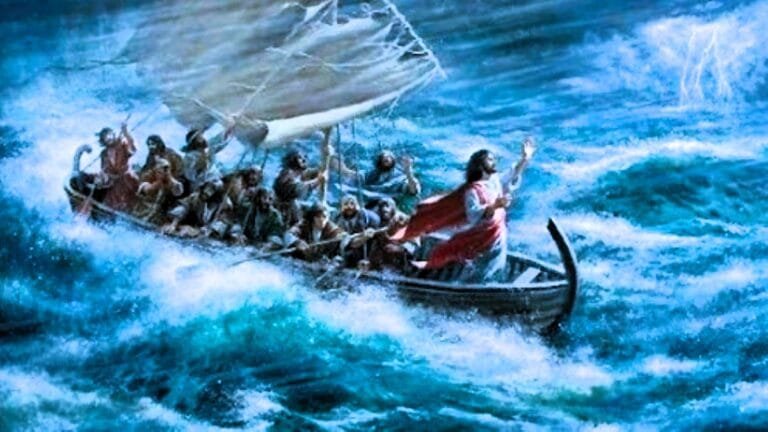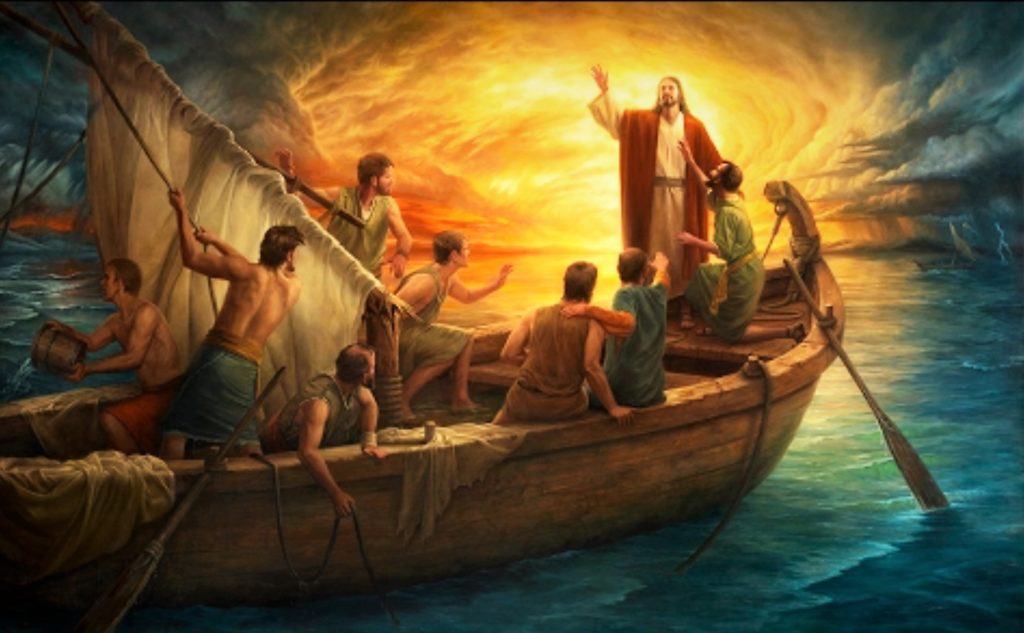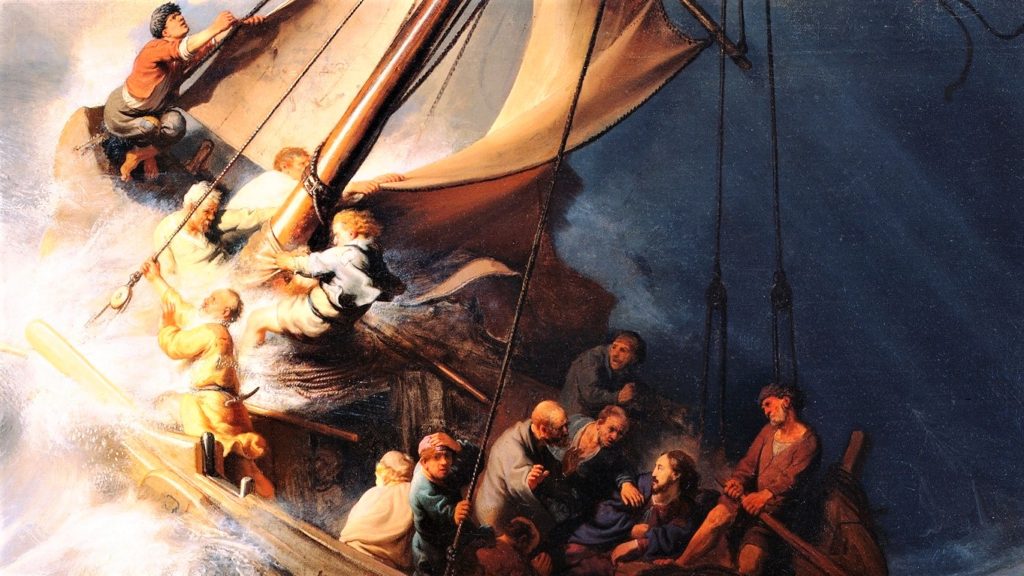POPE FRANCIS’ REFLECTION ON THE 12TH SUNDAY IN ORDINARY TIME YEAR B GOSPEL (Mk 4:35-41).
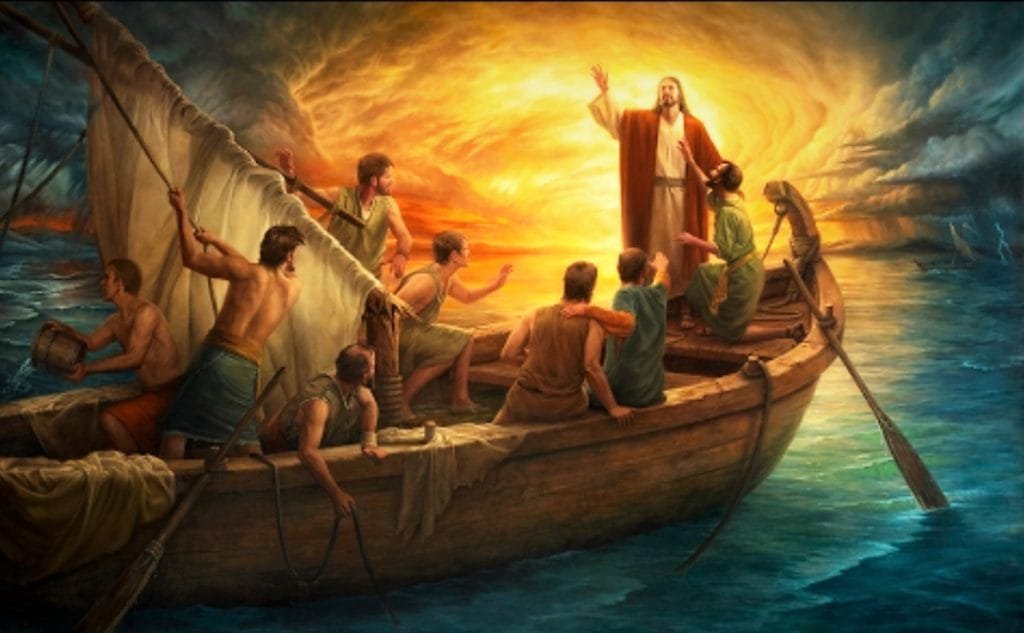
ANGELUS
St Peter’s Square
Sunday, 23 June 2024
________________________________________
Dear brothers and sisters, happy Sunday!
Today the Gospel presents us with Jesus on the boat with the disciples, on Lake Tiberias. A strong storm arrives unexpectedly, and the boat is in danger of sinking. Jesus, who was asleep, wakes up, threatens the wind and everything becomes calm again (cf. Mk 4:35-41).
But really, He doesn’t wake up, they awaken Him! With great fear, it is the disciples who awaken Jesus. The evening before, it was Jesus Himself who told the disciples to get on the boat and cross the lake. They were experts, they were fishermen, and that was their living environment, but a storm could put them in difficulty. It seems that Jesus wants to put them to the test. However, He does not leave them alone; He stays with them on the boat, calm; indeed, He even sleeps. And when the storm breaks, He reassures them with His presence, He encourages them, He incites them to have more faith and accompanies them beyond the danger. But we can ask this question: why does Jesus act in this way?
To strengthen the faith of the disciples and to make them more courageous. Indeed, they – the disciples – come out of this experience more aware of the power of Jesus and His presence in their midst, and therefore stronger and readier to face obstacles, difficulties, including the fear of venturing out to proclaim the Gospel. Having overcome this trial with Him, they will know how to face many others, even to the cross and martyrdom, to bring the Gospel to all peoples.
And Jesus does likewise with us too, in particular in the Eucharist: He gathers us around Him, He gives us His Word, He nourishes with His Body and His Blood, and then He invites us to set sail, to transmit everything we have heard and to share what we have received with everyone, in everyday life, even when it is difficult. Jesus does not spare us contrarieties but, without ever abandoning us, He helps us confront them. He makes us courageous. So we too, overcoming them with His help, learn more and more to hold onto Him, to trust in His power, which goes far beyond our capacities, to overcome uncertainties and hesitations, closures and preconceptions, and He does this with courage and greatness of heart, to tell everyone that the Kingdom of Heaven is present, it is here, and that with Jesus at our side we can make it grow together, beyond all barriers.
Let us ask ourselves, then: in times of trial, can I remember the times when I have experienced, in my life, the presence and help of the Lord? Let us think about it… When a storm arrives, do I let myself be overwhelmed by the turmoil or do I cling to Him – these inner storms, no? – do I cling to Him to find calm and peace, in prayer, silence, listening to the Word, adoration and fraternal sharing of faith?
May the Virgin Mary, who welcomed God’s will with humility and courage, give us, in difficult moments, the serenity of abandonment in Him.
Source and copyright: https://www.vatican.va/content/francesco/en/angelus/2024/documents/20240623-angelus.html
Copyright © Dicastero per la Comunicazione – Libreria Editrice Vaticana
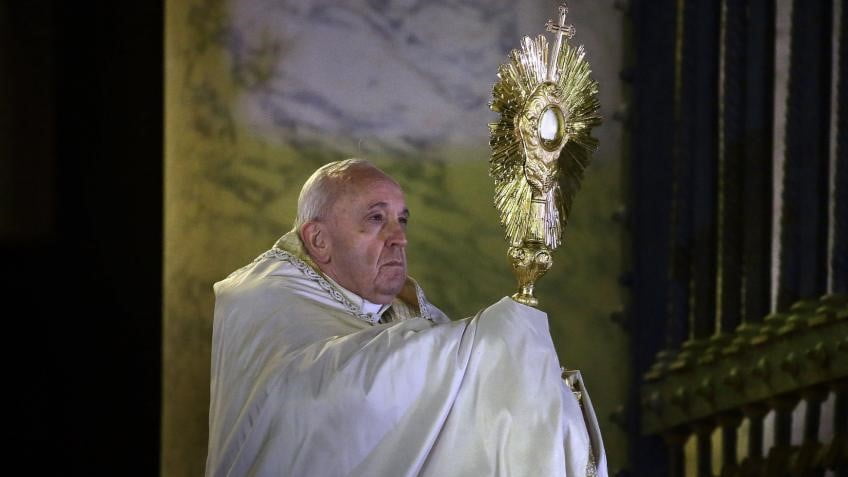
ANGELUS
Saint Peter’s Square
Sunday, 20 June 2021
__________________________________
Dear Brothers and Sisters, Buongiorno!
In today’s liturgy the episode of the storm calmed by Jesus (Mk 4:35-41) is told. The boat on which the disciples are crossing the lake is beaten by the wind and waves and they are afraid they will sink. Jesus is with them on the boat, yet he is in the stern asleep on the cushion. The disciples, filled with fear, cry out to him: “Teacher, do you not care if we perish?” (v. 38).
And quite often we too, beaten by the trials of life, have cried out to the Lord: “Why do you remain silent and do nothing for me?”. Especially when it seems we are sinking, because of love or the project in which we have laid great hopes disappears; or when we are at the mercy of the unrelenting waves of anxiety; or when we feel we are drowning in problems or lost in the middle of the sea of life, with no course and no harbour. Or even, in the moments in which the strength to go forward fails us, because we have no job, or an unexpected diagnosis makes us fear for our health or that of a loved one. There are many moments in which we feel we are in a storm; we feel we are almost done in.
In these situations and in many others, we too feel suffocated by fear and, like the disciples, risk losing sight of the most important thing. On the boat, in fact, even if he is sleeping, Jesus is there, and he shares with his own all that is happening. His slumber, when on the one hand it surprises us, on the other it puts us to the test. The Lord is there, present; indeed, he waits – so to speak – for us to engage him, to invoke him, to put him at the centre of what we are experiencing. His slumber causes us to wake up. Because to be disciples of Jesus it is not enough to believe God is there, that he exists, but we must put ourselves out there with him; we must also raise our voice with him. Hear this: we must cry out to him. Prayer, many times, is a cry: “Lord, save me!”. I was watching, on the programme “In his image”, today, the Day of Refugees, many who come in large boats and at the moment of drowning cry out: “Save us!”. In our life too the same thing happens: “Lord, save us!”, and prayer becomes a cry.
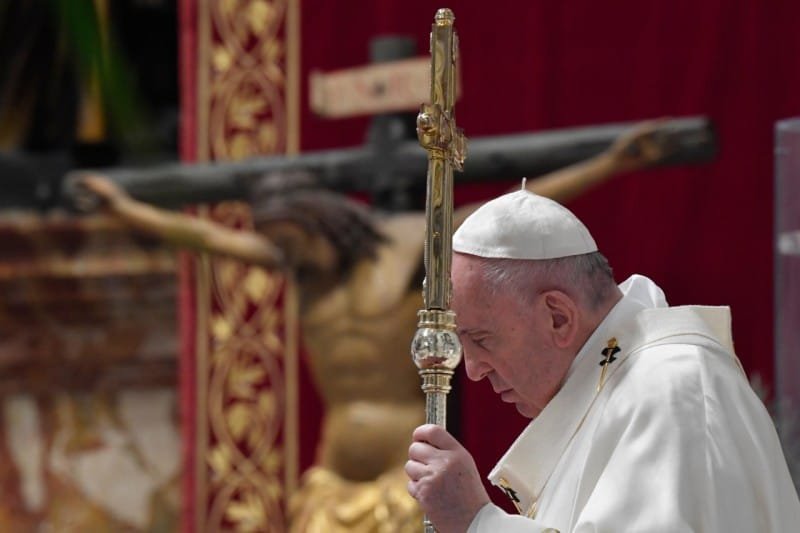
Today we can ask ourselves: what are the winds that beat against my life? What are the waves that hinder my navigation, and put my spiritual life, my family life, even my psychic life in danger? Let us say all this to Jesus; let us tell him everything. He wants this; he wants us to grab hold of him to find shelter from the unexpected waves of life. The Gospel recounts that the disciples approach Jesus, wake him and speak to him (cf. v. 38). This is the beginning of our faith: to recognize that alone we are unable to stay afloat; that we need Jesus like sailors need the stars to find their course. Faith begins from believing that we are not enough for ourselves, from feeling in need of God. When we overcome the temptation to close ourselves off, when we overcome the false religiosity that does not want to disturb God, when we cry out to him, he can work wonders in us. It is the gentle and extraordinary power of prayer, which works miracles.
Jesus, begged by the disciples, calms the wind and waves. And he asks them a question, a question which also pertains to us: “Why are you afraid? Have you no faith?” (v. 40). The disciples were gripped with fear, because they were focused on the waves more than looking at Jesus. And fear leads us to look at the difficulties, the awful problems and not to look at the Lord, who many times is sleeping. It is this way for us too: how often we remain fixated on problems rather than going to the Lord and casting our concerns into him! How often we leave the Lord in a corner, at the bottom of the boat of life, to wake him only in a moment of need! Today, let us ask for the grace of a faith that never tires of seeking the Lord, of knocking at the door of his Heart. May the Virgin Mary, who in her life never stopped trusting in God, reawaken in us the basic need of entrusting ourselves to him each day.
SOURCE: https://www.vatican.va/content/francesco/en/angelus/2021/documents/papa-francesco_angelus_20210620.html
EMPHASIS MINE.
EXTRAORDINARY MOMENT OF PRAYER
PRESIDED OVER BY POPE FRANCIS
Sagrato of St Peter’s Basilica
Friday, 27 March 2020
“When evening had come” (Mk 4:35). The Gospel passage we have just heard begins like this. For weeks now it has been evening. Thick darkness has gathered over our squares, our streets and our cities; it has taken over our lives, filling everything with a deafening silence and a distressing void, that stops everything as it passes by; we feel it in the air, we notice in people’s gestures, their glances give them away. We find ourselves afraid and lost. Like the disciples in the Gospel we were caught off guard by an unexpected, turbulent storm. We have realized that we are on the same boat, all of us fragile and disoriented, but at the same time important and needed, all of us called to row together, each of us in need of comforting the other. On this boat… are all of us. Just like those disciples, who spoke anxiously with one voice, saying “We are perishing” (v. 38), so we too have realized that we cannot go on thinking of ourselves, but only together can we do this.
It is easy to recognize ourselves in this story. What is harder to understand is Jesus’ attitude. While his disciples are quite naturally alarmed and desperate, he stands in the stern, in the part of the boat that sinks first. And what does he do? In spite of the tempest, he sleeps on soundly, trusting in the Father; this is the only time in the Gospels we see Jesus sleeping. When he wakes up, after calming the wind and the waters, he turns to the disciples in a reproaching voice: “Why are you afraid? Have you no faith?” (v. 40).
Let us try to understand. In what does the lack of the disciples’ faith consist, as contrasted with Jesus’ trust? They had not stopped believing in him; in fact, they called on him. But we see how they call on him: “Teacher, do you not care if we perish?” (v. 38). Do you not care: they think that Jesus is not interested in them, does not care about them. One of the things that hurts us and our families most when we hear it said is: “Do you not care about me?” It is a phrase that wounds and unleashes storms in our hearts. It would have shaken Jesus too. Because he, more than anyone, cares about us. Indeed, once they have called on him, he saves his disciples from their discouragement.
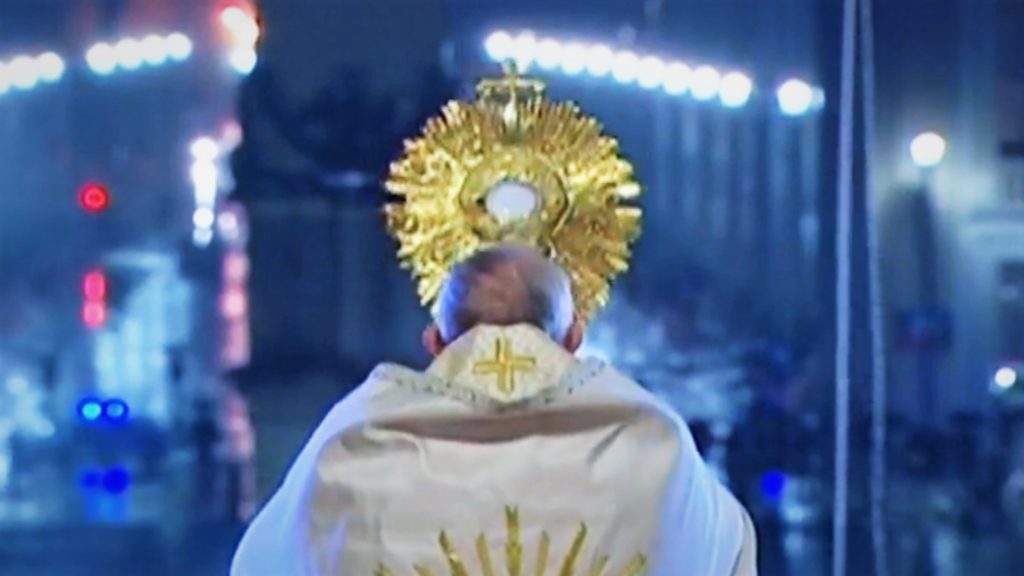
The storm exposes our vulnerability and uncovers those false and superfluous certainties around which we have constructed our daily schedules, our projects, our habits and priorities. It shows us how we have allowed to become dull and feeble the very things that nourish, sustain and strengthen our lives and our communities. The tempest lays bare all our prepackaged ideas and forgetfulness of what nourishes our people’s souls; all those attempts that anesthetize us with ways of thinking and acting that supposedly “save” us, but instead prove incapable of putting us in touch with our roots and keeping alive the memory of those who have gone before us. We deprive ourselves of the antibodies we need to confront adversity.
In this storm, the façade of those stereotypes with which we camouflaged our egos, always worrying about our image, has fallen away, uncovering once more that (blessed) common belonging, of which we cannot be deprived: our belonging as brothers and sisters.
“Why are you afraid? Have you no faith?” Lord, your word this evening strikes us and regards us, all of us. In this world, that you love more than we do, we have gone ahead at breakneck speed, feeling powerful and able to do anything. Greedy for profit, we let ourselves get caught up in things, and lured away by haste. We did not stop at your reproach to us, we were not shaken awake by wars or injustice across the world, nor did we listen to the cry of the poor or of our ailing planet. We carried on regardless, thinking we would stay healthy in a world that was sick. Now that we are in a stormy sea, we implore you: “Wake up, Lord!”.
“Why are you afraid? Have you no faith?” Lord, you are calling to us, calling us to faith. Which is not so much believing that you exist, but coming to you and trusting in you. This Lent your call reverberates urgently: “Be converted!”, “Return to me with all your heart” (Joel 2:12). You are calling on us to seize this time of trial as a time of choosing. It is not the time of your judgement, but of our judgement: a time to choose what matters and what passes away, a time to separate what is necessary from what is not. It is a time to get our lives back on track with regard to you, Lord, and to others. We can look to so many exemplary companions for the journey, who, even though fearful, have reacted by giving their lives. This is the force of the Spirit poured out and fashioned in courageous and generous self-denial. It is the life in the Spirit that can redeem, value and demonstrate how our lives are woven together and sustained by ordinary people – often forgotten people – who do not appear in newspaper and magazine headlines nor on the grand catwalks of the latest show, but who without any doubt are in these very days writing the decisive events of our time: doctors, nurses, supermarket employees, cleaners, caregivers, providers of transport, law and order forces, volunteers, priests, religious men and women and so very many others who have understood that no one reaches salvation by themselves. In the face of so much suffering, where the authentic development of our peoples is assessed, we experience the priestly prayer of Jesus: “That they may all be one” (Jn 17:21). How many people every day are exercising patience and offering hope, taking care to sow not panic but a shared responsibility. How many fathers, mothers, grandparents and teachers are showing our children, in small everyday gestures, how to face up to and navigate a crisis by adjusting their routines, lifting their gaze and fostering prayer. How many are praying, offering and interceding for the good of all. Prayer and quiet service: these are our victorious weapons.
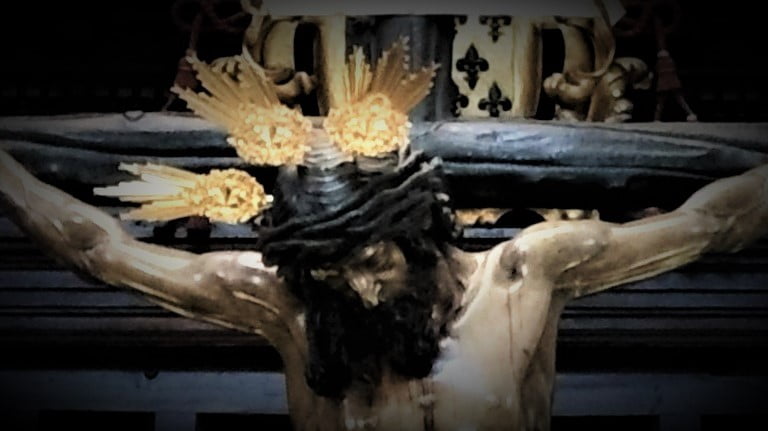
“Why are you afraid? Have you no faith”? Faith begins when we realise we are in need of salvation. We are not self-sufficient; by ourselves we founder: we need the Lord, like ancient navigators needed the stars. Let us invite Jesus into the boats of our lives. Let us hand over our fears to him so that he can conquer them. Like the disciples, we will experience that with him on board there will be no shipwreck. Because this is God’s strength: turning to the good everything that happens to us, even the bad things. He brings serenity into our storms, because with God life never dies.
The Lord asks us and, in the midst of our tempest, invites us to reawaken and put into practice that solidarity and hope capable of giving strength, support and meaning to these hours when everything seems to be floundering. The Lord awakens so as to reawaken and revive our Easter faith. We have an anchor: by his cross we have been saved. We have a rudder: by his cross we have been redeemed. We have a hope: by his cross we have been healed and embraced so that nothing and no one can separate us from his redeeming love. In the midst of isolation when we are suffering from a lack of tenderness and chances to meet up, and we experience the loss of so many things, let us once again listen to the proclamation that saves us: he is risen and is living by our side. The Lord asks us from his cross to rediscover the life that awaits us, to look towards those who look to us, to strengthen, recognize and foster the grace that lives within us. Let us not quench the wavering flame (cf. Is 42:3) that never falters, and let us allow hope to be rekindled.
Embracing his cross means finding the courage to embrace all the hardships of the present time, abandoning for a moment our eagerness for power and possessions in order to make room for the creativity that only the Spirit is capable of inspiring. It means finding the courage to create spaces where everyone can recognize that they are called, and to allow new forms of hospitality, fraternity and solidarity. By his cross we have been saved in order to embrace hope and let it strengthen and sustain all measures and all possible avenues for helping us protect ourselves and others. Embracing the Lord in order to embrace hope: that is the strength of faith, which frees us from fear and gives us hope.
“Why are you afraid? Have you no faith”? Dear brothers and sisters, from this place that tells of Peter’s rock-solid faith, I would like this evening to entrust all of you to the Lord, through the intercession of Mary, Health of the People and Star of the stormy Sea. From this colonnade that embraces Rome and the whole world, may God’s blessing come down upon you as a consoling embrace. Lord, may you bless the world, give health to our bodies and comfort our hearts. You ask us not to be afraid. Yet our faith is weak and we are fearful. But you, Lord, will not leave us at the mercy of the storm. Tell us again: “Do not be afraid” (Mt 28:5). And we, together with Peter, “cast all our anxieties onto you, for you care about us” (cf. 1 Pet 5:7).
© Copyright – Libreria Editrice Vaticana
EMPHASIS MINE.
SEE AS WELL:
12TH SUNDAY IN ORDINARY TIME YEAR B MASS PRAYERS AND READINGS HERE.
HOMILY REFLECTION FOR THE 12TH SUNDAY IN ORDINARY TIME YEAR B HERE.
Stay updated: subscribe by email for free TO OUR NEW WEBSITE www.catholicsstrivingforholiness.org (PUT YOUR EMAIL IN THE SUBSCRIBE WIDGET).
We are also in www.fb.com/Catholicsstrivingforholiness. Kindly help more people in their Christian life by liking our page and inviting your family, friends and relatives to do so as well. Thanks in advance and God bless you and your loved ones! Fr. Rolly Arjonillo
